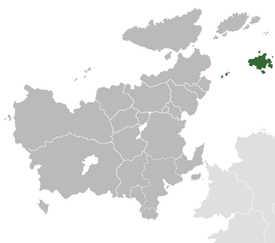Greater Blostland: Difference between revisions
No edit summary |
No edit summary |
||
| Line 49: | Line 49: | ||
===Järnflotten=== | ===Järnflotten=== | ||
Functionalism had reached Blostland around 1919, the ideology, while originally being considered something only the Gaullophiles enjoyed, would quickly expand outside its niche community after writer, Börje Östlund, translated much of the founding texts of Functionalism into Blostlandic. Only a year later Valter Hansdotter, a founding member of Järnflotten and a close associate of Åberg, would start a Functionalist reading club in Raudrena’s Salon district, Often called the “Barracks” because of its high number of soldier participants the club would attract many lower class members of society who were unsatisfied with the Kungars krets and too nationalistic for Vallmoparti. It’s on August 11th 1920 that Hansdotter would meet Åberg, they would quickly become friends and start to swap their opinions on Functionalist theories over their famous early 20’s dinners. Åberg would eventually become the rising star of the Barracks, his interpretation of Functionalism kept much of its root principles but also allowed wiggle room for certain elements popular in Blostland at the time such as Pagan Revivalism. On November 9th 1920 Åberg and Hansdotter would found Järnflotten, named after the famous iron raft of the first Blostlandic King, the party’s founding charter would explicitly call out the actions of Kungars krets and Vallmoparti as being reasons for its founding. | |||
===The | ===The black week=== | ||
==Government== | ==Government== | ||
Revision as of 00:40, 12 August 2023
This article is incomplete because it is pending further input from participants, or it is a work-in-progress by one author. Please comment on this article's talk page to share your input, comments and questions. Note: To contribute to this article, you may need to seek help from the author(s) of this page. |
Greater Kingdom of Blostland Storriket Blostländska | |||||||||
|---|---|---|---|---|---|---|---|---|---|
| Motto: "Med Blostland - till döden!"(Blostlandic) “With Blostland - till death!" | |||||||||
 | |||||||||
| Capital | Raudrena | ||||||||
| Common languages | Blostlandic | ||||||||
| Religion | Pure Sotirianity | ||||||||
| Government | Järnist one-party totalitarian duumvirate | ||||||||
| Anförare | |||||||||
• 1923–1935 | Karl Åberg | ||||||||
| King | |||||||||
• 1920-1935 | Oscar I (acting) | ||||||||
| Currency | Blostdlandic krona (BOK) | ||||||||
| |||||||||
| Today part of | Blostland | ||||||||
The Greater Kingdom of Blostland or Greater Blostland was the former Government of Blostland during the Great War (Kylaris)
1923 election
Prelude to the election
Preceding the election of 1923 Blostland was in its darkest age, the populace had lost all hope of restoring the once mighty Kingdom after the economic crisis that was the Line Island War. This compounded by the lackluster rule of the Kingsmen would eventually lead to the political climate that allowed for the rise of Järnflotten and Functionalism. Blostland, while having a strong labor movement was still majority conservative, the farmer and business classes had essentially monopolized the political system that was born after the Vallmo Uprising creating this new aristocracy that had for a while, kept the peace. The lower class and the growing middle class however began to despise the Kingsmen and their new aristocracy, corruption and favoritism plagued the party and by 1923 it was pretty much an open secret with events such as the expulsion of David Gron from Parliament and the passing of multiple tax cuts for billionaires & farmers making massive headlines when they occurred a few years prior.
Järnflotten
Functionalism had reached Blostland around 1919, the ideology, while originally being considered something only the Gaullophiles enjoyed, would quickly expand outside its niche community after writer, Börje Östlund, translated much of the founding texts of Functionalism into Blostlandic. Only a year later Valter Hansdotter, a founding member of Järnflotten and a close associate of Åberg, would start a Functionalist reading club in Raudrena’s Salon district, Often called the “Barracks” because of its high number of soldier participants the club would attract many lower class members of society who were unsatisfied with the Kungars krets and too nationalistic for Vallmoparti. It’s on August 11th 1920 that Hansdotter would meet Åberg, they would quickly become friends and start to swap their opinions on Functionalist theories over their famous early 20’s dinners. Åberg would eventually become the rising star of the Barracks, his interpretation of Functionalism kept much of its root principles but also allowed wiggle room for certain elements popular in Blostland at the time such as Pagan Revivalism. On November 9th 1920 Åberg and Hansdotter would found Järnflotten, named after the famous iron raft of the first Blostlandic King, the party’s founding charter would explicitly call out the actions of Kungars krets and Vallmoparti as being reasons for its founding.
The black week
Government
Järnist functionalism
The monarchy
Church and state
Society
Economics
Politics
Religion
Military
Goal of imperialism
In euclea
In asteria superior




